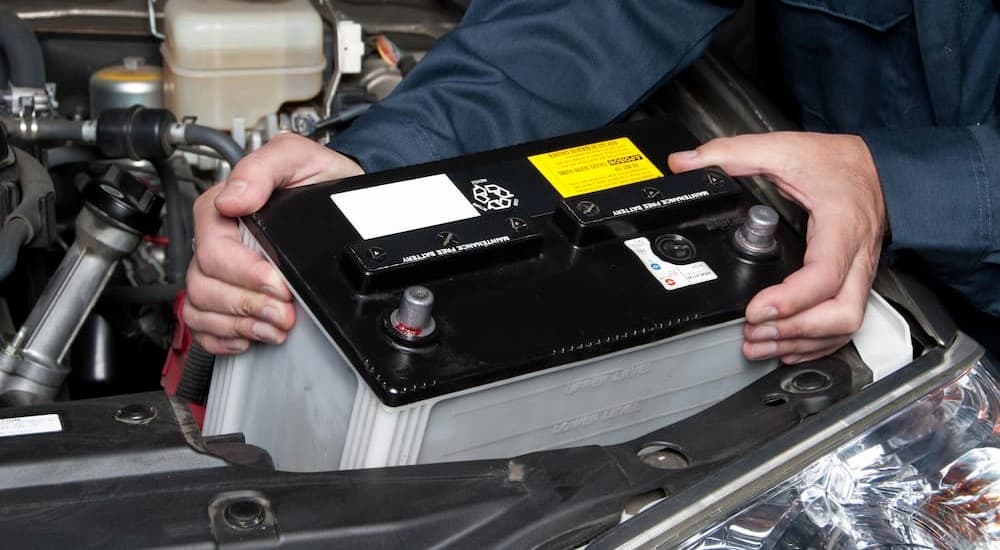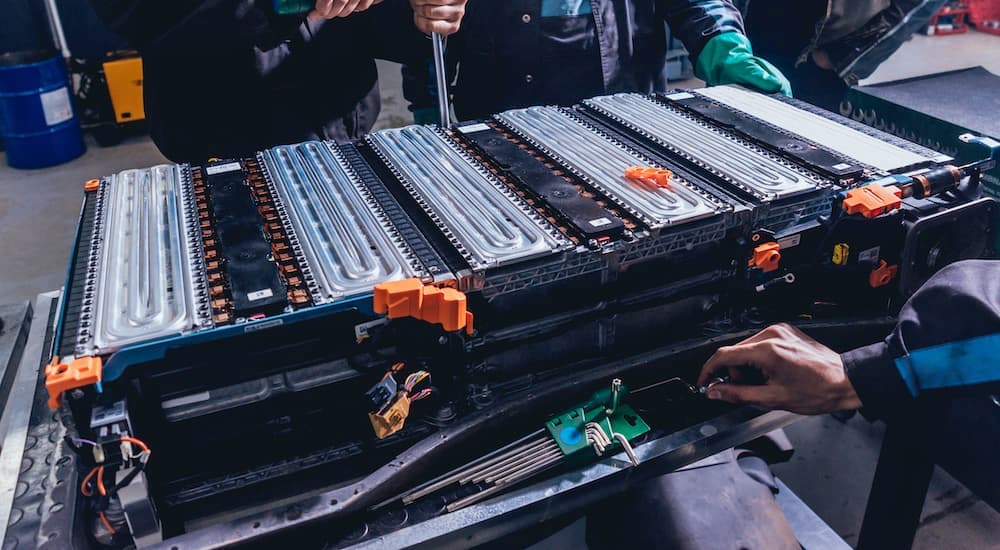There are a lot of options available when it comes to car batteries. Not only does virtually every auto parts chain have its own battery line—such as Auto Zone’s Duralast and O’Reilly’s Super Start—but many car manufacturers have now gotten in on the game with options like Ford Motorcraft and Toyota TrueStart batteries. These OEM options promise superior performance because they are designed specifically for your vehicle, and many come with factory-backed warranties.
But are these OEM batteries really worth it, or are you better off buying an aftermarket option? It’s true that many of the claims about the superiority of factory-branded batteries are overblown. However, while you will see a lot of advice to steer clear of OEM batteries entirely and stick to aftermarket options, the truth is that, for most drivers, the batteries you will find at your local dealership are the superior choice.
Designed for Your Car? Yes and No
For the most part, a 12-volt battery is a pretty simple piece of technology, and the claims that OEM batteries are better for your vehicle are questionable at best. Factory-branded batteries are also usually made by the same companies that make aftermarket batteries.
For instance, Toyota’s TrueStart batteries are generally manufactured by Exide Technologies, which is also the battery supplier for Bosch and EverStart and sells aftermarket batteries under its own name. This means a little digging can turn up a variety of non-factory options made by the company as the factory-branded options at your local dealership.
That said, not all battery options are created equal. While the 12-volt battery may be a simple piece of technology, quality varies greatly between different battery manufacturers and even different battery brands from the same manufacturer. For instance, Exide-branded batteries include both the budget Sprinter series and the high-end Marathon series.
The batteries it makes for other aftermarket brands likewise vary in quality, with an Exide battery for Bosch likely being higher quality than an Exide battery for EverStart. In general, OEM batteries like TrueStart will usually be specced to a relatively high level compared to the majority of the aftermarket batteries available. Toyota, in particular, is known to be extremely demanding of its third-party parts suppliers to maintain its reputation for quality.

Dealer Support and Warranties
In addition to representing a known level of quality, OEM car batteries have the advantage of dealership support and usually come with pretty good warranties. For instance, Toyota provides free battery exchange with no mileage limit for 24 months and prorated battery replacement for 84 months when you buy a TrueStart battery. Ford Motorcraft goes even further with its top-shelf BXT Tested Tough MAX batteries, which have a 100-month warranty.
The fact that most manufacturers are willing to offer such good warranties on their OEM battery lines speaks to the fact that they trust the quality of their product––after all, if their batteries were regularly failing after a couple of years, they’d be losing a ton of money on those warranties.
Buying an OEM battery also comes with the advantage of dealership support. While you can buy a 12-volt car battery virtually anywhere, Walmart might not be as good about supporting your purchase if you have problems down the road as your local Toyota dealership. Plus, a quick look at the warranties Walmart offers on its EverStart batteries reveals they fall short of OEM options like TrueStart.
The base EverStart Value only comes with a 12-month warranty, and even their top EverStart Maxx is only covered for 36 months (although you can pay extra for 60 months of coverage). If you’re the type of driver who prefers to think about car maintenance as little as possible, buying an OEM battery from your local dealership makes a lot of sense.
Counting Pennies
The biggest reason most people choose an aftermarket battery is to save money. However, OEM batteries are not actually that expensive. In fact, Toyota TrueStart batteries often undercut many aftermarket batteries on price while offering superior warranties and quality.
While it might be a different story if you are buying an OEM battery for a luxury car like a BMW or Mercedes, most mass-market car batteries are more affordable than you might expect. However, be sure to ask about the labor and disposal costs of having a battery replaced. While the battery itself may be reasonably priced, some dealerships will try to increase the cost by adding high labor and battery disposal fees.
Note that, in some cases, these fees are justified. For example, some cars have their batteries located in odd spots that may require putting the vehicle on a lift, removing trim pieces, or other work to replace it. Many newer cars also need to be reprogrammed for the new battery; this is a relatively simple process that tells the car it has a new battery and what type of battery it is so the vehicle can optimize the charge and discharge rates—but it does require a bit of time and access to special tools.
If your car has special battery change requirements, it is an even better idea to go to a dealership to have the process handled correctly, but always look out for unscrupulous service departments trying to make a quick buck.

Specialty Batteries
So far, we’ve focused on your standard 12-volt lead-acid battery. However, many modern vehicles are moving to more complex electrical systems. Hybrids and electric vehicles obviously have their special high-voltage batteries that provide propulsive power, but we’re also beginning to see specialty options like 12-volt lithium-ion starter batteries.
Porsche was one of the first manufacturers to ship cars with this technology back in 2009, and other manufacturers like BMW and Tesla have since jumped on board. Lithium-ion batteries have many advantages over lead-acid batteries, including massive reductions in weight, longer battery life, and deeper discharge rates. However, when one goes bad, you’ll need to replace it with an OEM battery.
While aftermarket lithium-ion starter batteries exist, they are generally designed to replace lead-acid batteries. This means they will not necessarily be a drop-in replacement for a factory lithium-ion battery. Further, just like traditional batteries, many aftermarket specialty batteries are not manufactured to the same level of quality as factory options.
With a lead-acid battery, a low-quality design simply won’t last as long. With a lithium-ion battery, a low-quality option might be lacking the critical voltage regulators and other safety features needed to prevent dangerous conditions from developing. In general, if your car comes with something other than a standard 12-volt lead-acid battery, it is a wise decision to stick with an OEM battery.
Don’t Be Afraid to Visit a Dealership for a New Battery
Dead batteries are responsible for more than their fair share of stranded motorists, and it doesn’t make sense to cheap out on your next car battery. There are tons of high-quality aftermarket batteries available, but if you don’t want to spend the time digging through all of your options, then an OEM battery from your local dealership represents a known level of quality at a reasonable price––especially if it comes with extensive warranties like Toyota offers for its TrueStart batteries.
If you’re not a DIY expert looking to upgrade your car battery to something better than OEM, don’t be afraid to visit your dealership when it comes time to replace the battery in your car.

